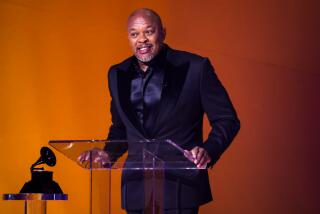Serene Branson had a âcomplex migraine,â not a stroke, doctor says [Updated]
[Updated, 8:02 p.m. Feb. 17: This post, based on information supplied by a UCLA publicist, said Dr. Neil Martin diagnosed Serene Branson with âcomplex migraine.â UCLA has since said that Martin and Dr. Andrew Charles, director of UCLAâs Headache Research and Treatment Program, diagnosed Branson with âmigraine aura.â Click here for the latest on the story, including an interview with Dr. Charles.]
This post has been corrected. See the note at the bottom for details.
KCBS 2 television reporter Serene Bransonâs garbled speech during a live Grammy broadcast last Sunday was not the result of a small stroke as many have speculated but was instead a symptom of a âcomplex migraine,â according to her physician, Dr. Neil Martin, chief of neurosurgery at the Ronald Reagan UCLA Medical Center. Martin received permission from Branson to discuss her condition publicly.
Branson appeared fine when she appeared on air following the awards show, but her words made no sense, and the showâs producers immediately cut away from her and paramedics were called. She recovered quickly and was taken home.
A complex migraine can mimic the symptoms of a stroke, with weakness, loss of vision and difficulty speaking, in addition to a headache. It is often mistaken for a stroke.
As the medical information website HealthCentral.com explains, âone theory about the cause of migraines is that blood vessels in the brain suddenly narrow (or spasm) and then dilate. â When they dilate, the headache develops. But âduring the spasm phase, certain parts of the brain may receive too little blood, and this may cause the stroke-like symptoms.... The neurological symptoms are nearly always temporary.â
For the record, 7:15 p.m. Feb. 17: An earlier version of this post erred in not correctly attributing the last paragraph to the medical information website HealthCentral.com.
More to Read
Sign up for Essential California
The most important California stories and recommendations in your inbox every morning.
You may occasionally receive promotional content from the Los Angeles Times.










